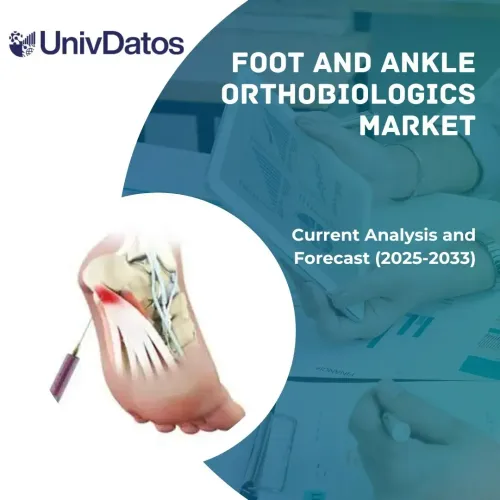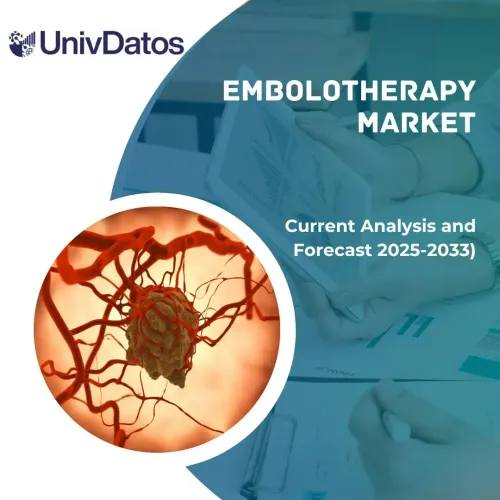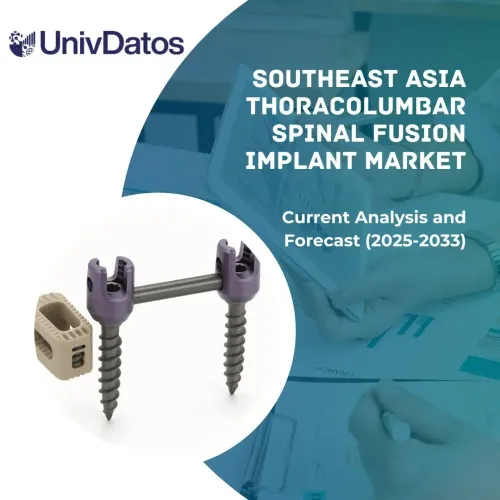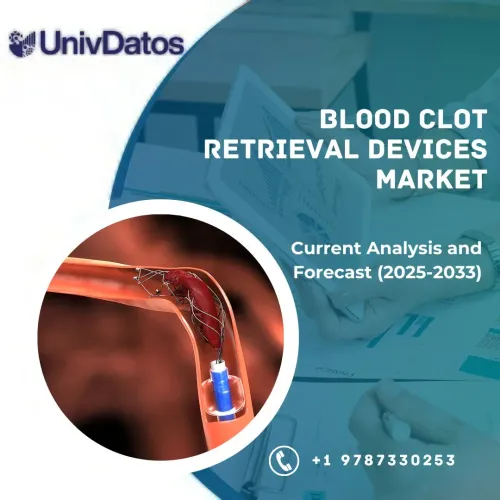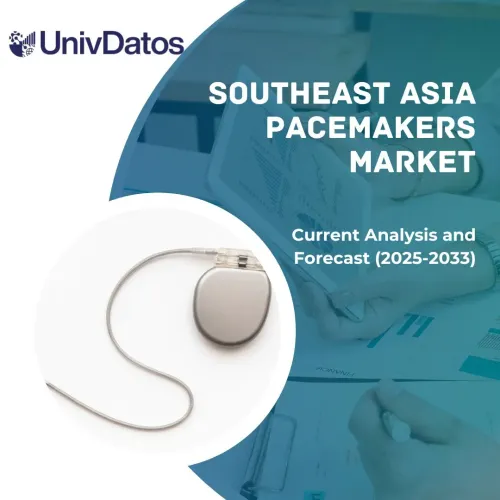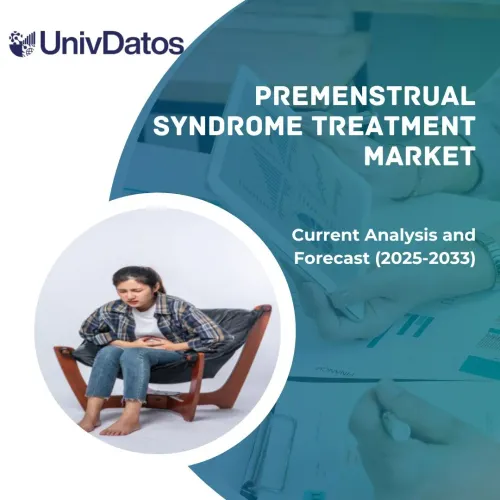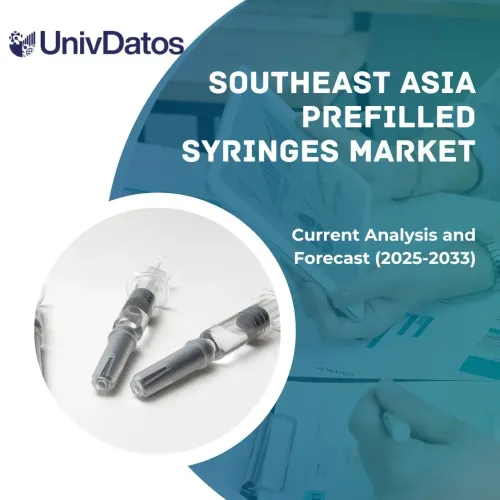- Home
- About Us
- Industry
- Services
- Reading
- Contact Us
Topical Drugs Contract Manufacturing Market: Current Analysis and Forecast (2025-2033)
Emphasis on Product Type (Semi-Solid Formulations {Creams, Ointments, Gel, and Others}); Liquid Formulations, and Solid Formulations); Therapeutic Area (Dermatology, Pain Management, and Others); End-use (Pharmaceutical Companies, Biopharmaceutical Companies, and Others); and Region/Country
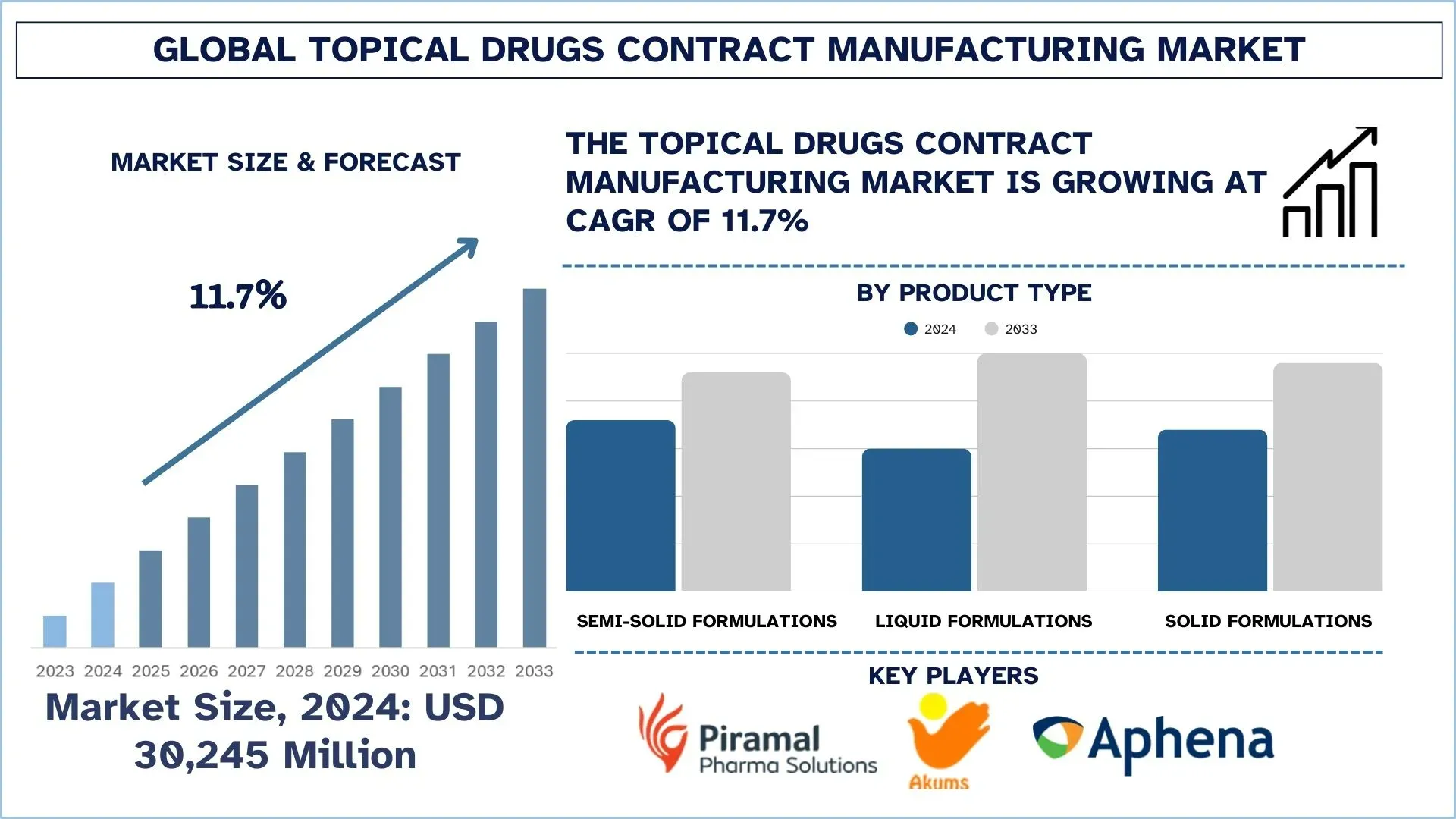
Global Topical Drugs Contract Manufacturing Market Size & Forecast
The global topical drugs contract manufacturing market was valued at USD 30,245 million in 2024 and is expected to grow to a strong CAGR of around 11.7% during the forecast period (2025-2033F), owing to the rising prevalence of skin disorders, increasing demand for cost-effective and scalable production, and growing preference for outsourcing among pharmaceutical companies.
Topical Drugs Contract Manufacturing Market Analysis
Topical drugs contract manufacturing involves the delegation of the manufacturing of topical pharmaceutical products, such as creams, ointments, gels, lotions, etc., to third parties. These operate on specific specifications, formulations, and the regulatory requirements that the client, usually a pharmaceutical or biotechnology company, comes up with. They are able to minimize capital costs, outsource a number of business functions, concentrate on distinctive competencies such as R&D and marketing, and leverage economies of scale. Contract manufacturers, which also abide by GMP, are less costly and can also help with the packaging and labeling of the products. The service finds its application in different therapeutic markets, including dermatology, pain management, and wound care.
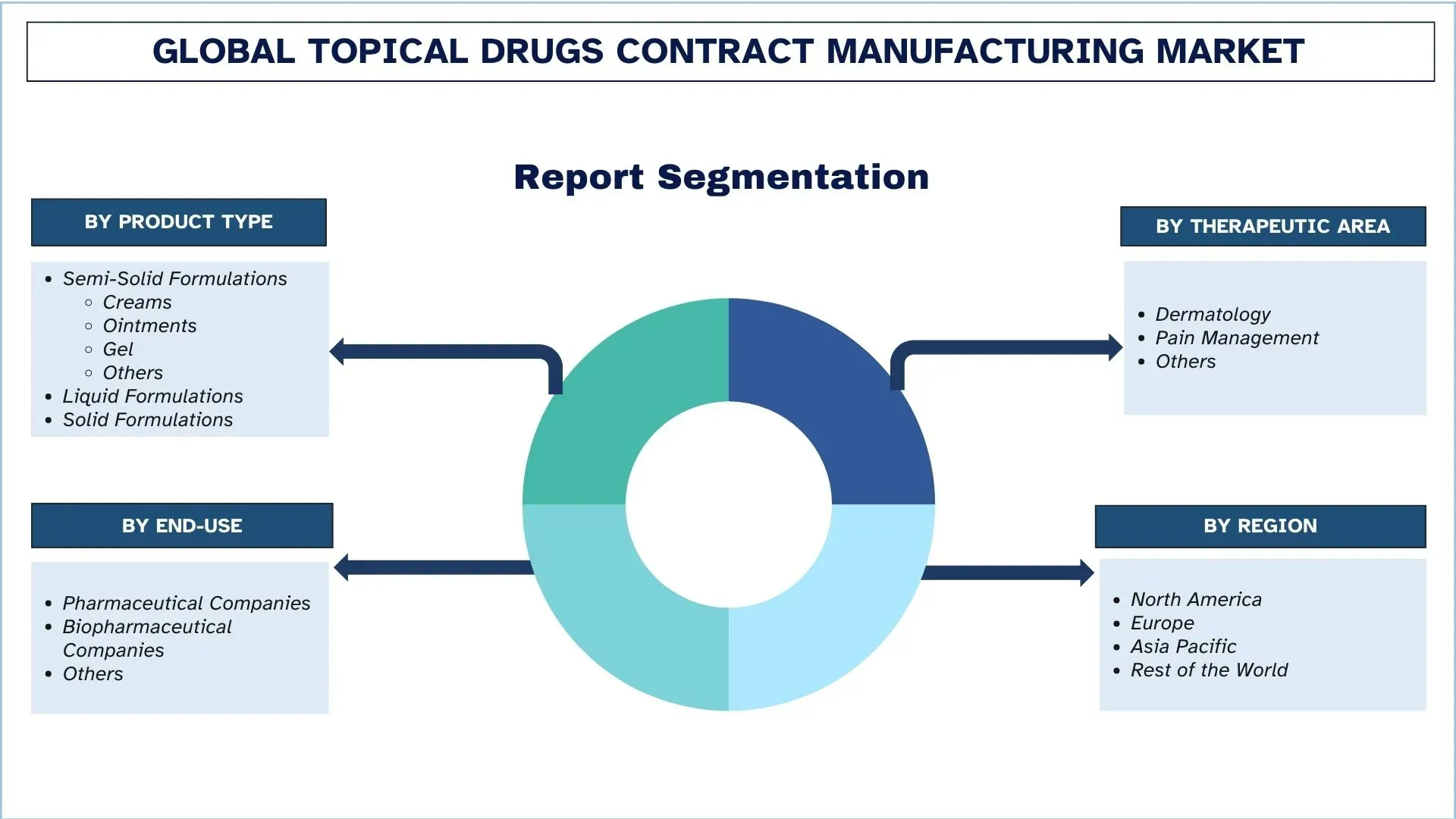
Global Topical Drugs Contract Manufacturing Market Trends
This section discusses the key market trends that are influencing the various segments of the global topical drugs contract manufacturing market, as found by our team of research experts.
Integration of AI in Manufacturing Processes
AI in the topical drug manufacturing industry proved to be efficient in making production superior while improving quality control and predictive maintenance. This gives the manufacturers the ability to analyze real-time data to identify areas of concern, faulty batches, and non-compliance with formulation specifications. In contract manufacturing, a number of business operations such as process automation, inventory management, and document control are always enhanced by the application of Artificial Intelligence, which leads to speeding up of operations and reduction in costs. It also serves a formulation development purpose, where it predicts the interaction of the ingredients. The need to enhance speed and accuracy in manufacturing is becoming increasingly relevant in CDMO markets, and the application of AI in such aspects as R&D, production, and quality assurance is essential for the evolution of the topical drug market.
Topical Drugs Contract Manufacturing Industry Segmentation
This section provides an analysis of the key trends in each segment of the global topical drugs contract manufacturing market report, along with forecasts at the global, regional, and country levels for 2025-2033.
Semi-Solid Formulations Segments Dominates the Topical Drugs Contract Manufacturing Market.
Based on product type, the market is categorized into semi-solid formulations, liquid formulations, and solid formulations. Out of these, the semi-solid formulations segment, including creams, gels, and ointments, currently dominates the topical drugs contract manufacturing market. They possess features such as flexibility, ease of use, convenience, and patient preference; hence, they are widely used, especially in dermatological applications. However, the solid formulations segment, including the powders and patches, is anticipated to be the most promising with maximum growth rates due to the enhancements in drug delivery systems and the growing necessity of new topical forms of medication delivery. This growth is a result of the increasing incidence of skin diseases and the rising trend of seeking localized and non-surgical treatments.
Dermatology Segment Dominates the Topical Drugs Contract Manufacturing Market.
Based on therapeutic area category, the market is categorized into dermatology, pain management, and others. Out of these, dermatology holds the largest share in the topical drugs contract manufacturing market. This can be largely attributed to the high incidence rates of skin diseases such as acne, eczema, and psoriasis, which require topical care. Topical preparations are most commonly used in dermatology since they offer the advantage of focusing the active substance on the area of the skin to be treated, thus avoiding side effects linked to its systemic absorption. However, the pain management segment is expected to be the fastest-growing segment. This anticipated expansion is attributed to the demand for non-surgical analgesic treatments that encompass transdermal patches and gels that enhance patient compliance.
The North America region holds a significant market share in the Global Topical Drugs Contract Manufacturing Market.
North America has a large share in the topical drugs contract manufacturing market because of the well-established pharmaceutical sector, higher healthcare expenditure, and a large requirement for dermatological medicines. The leading CDMOs that have sophisticated technology and firsthand compliance with the FDA make the outsourcing of production appealing to large pharma. High incidence of skin diseases in the region and an increasing trend toward OTC topical products are factors that support steady demand. In addition, strategic partnerships, continuous evolution in drug delivery technologies, and supply chain also make North America a favorable region and a preferred hub for contract manufacturing.
The United States held a Dominant share of the North America Topical Drugs Contract Manufacturing Market in 2024
The United States is the largest market for the topical drugs contract manufacturing in North America due to its intensified pharmaceutical manufacturing industry, growth of key CDMOs, and a favorable regulatory landscape. The country delivers a large and growing population of patients suffering from chronic dermatological diseases, including eczema, psoriasis, and acne, thereby creating continuing demand for topical treatments. Also, robust investment in research and development, early adoption of efficient technologies, and sharing the intellectual property rights also motivate both native and international pharma companies to outsource topical drug production in the United States of America. The solid distribution network, demand for natural premium topical applications, and the need to outsource to lower costs and shorten the time-to-market make the United States the leading segment in this market.
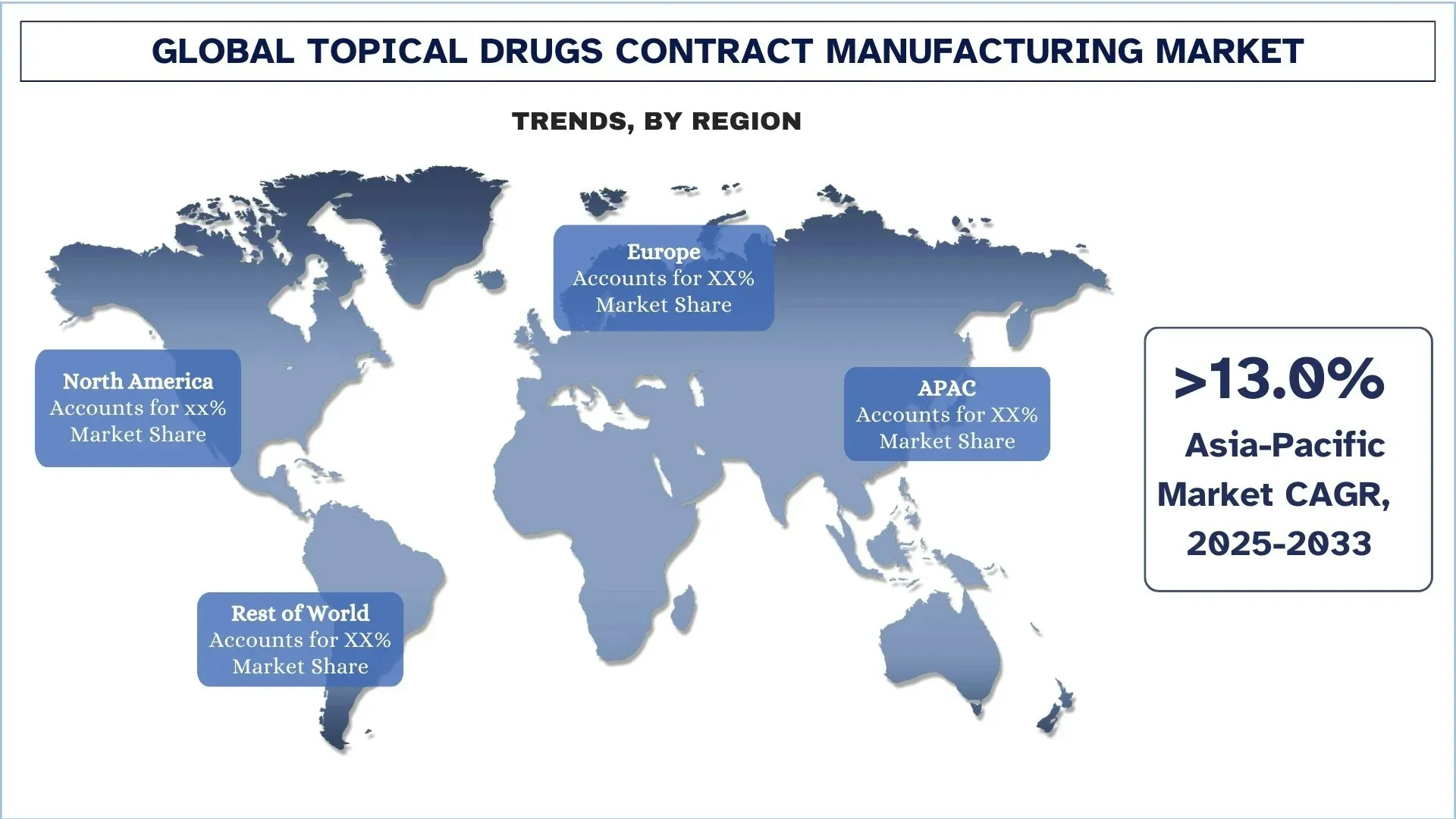
Topical Drugs Contract Manufacturing Industry Competitive Landscape
The global topical drugs contract manufacturing market is competitive, with several global and international market players. The key players are adopting different growth strategies to enhance their market presence, such as partnerships, agreements, collaborations, geographical expansions, and mergers and acquisitions.
Top Topical Drugs Contract Manufacturing Market Manufacturing Companies
Some of the major players in the market are Piramal Pharma Limited, Akums Drugs and Pharmaceuticals Ltd., Vetter, Zoic Biotech Private Limited, MedPharm, TEDOR Pharma, Inc., Mikart, LLC, Aphena Pharma Solutions, Gracure Pharmaceuticals Ltd., and Medlock Pharma.
Recent Developments in the Topical Drugs Contract Manufacturing Market
In November 2024 – Akums Drugs and Pharmaceuticals, a prominent Indian contract manufacturing company, announced an in-licensing agreement with Caregen, a global biotechnology firm headquartered in South Korea. This strategic alliance is aimed at introducing a range of specialty nutraceuticals, pharmaceuticals, and differentiated topical and injectable cosmeceuticals, including advanced skin care and hair care solutions, specifically designed to cater to the evolving needs of Indian consumers.
In July 2024 – MedPharm, Ltd. and Tergus Pharma jointly announced their merger, forming a unified topical and transepithelial Contract Development and Manufacturing Organization (CDMO). The newly combined entity will operate under the MedPharm name, positioning itself as a leading end-to-end CDMO with strong capabilities in scientific research, clinical trial manufacturing, and commercial-scale production.
Global Topical Drugs Contract Manufacturing Market Report Coverage
Details | |
Base year | 2024 |
Forecast period | 2025-2033 |
Growth momentum | Accelerate at a CAGR of 11.7% |
Market size 2024 | USD 30,245 Million |
Regional analysis | North America, Europe, APAC, Rest of the World |
Major contributing region | Asia-Pacific is expected to dominate the market during the forecast period. |
Key countries covered | U.S., Canada, Germany, U.K., Spain, Italy, France, China, Japan, and India |
Companies profiled | Piramal Pharma Limited, Akums Drugs and Pharmaceuticals Ltd., Vetter, Zoic Biotech Private Limited, MedPharm, TEDOR Pharma, Inc., Mikart, LLC, Aphena Pharma Solutions, Gracure Pharmaceuticals Ltd., and Medlock Pharma. |
Report Scope | Market Trends, Drivers, and Restraints; Revenue Estimation and Forecast; Segmentation Analysis; Demand and Supply Side Analysis; Competitive Landscape; Company Profiling |
Segments Covered | By Product Type, By Therapeutic Area, By End-use, By Region/Country |
Reasons to Buy Topical Drugs Contract Manufacturing Market Report:
The study includes market sizing and forecasting analysis confirmed by authenticated key industry experts.
The report briefly reviews overall industry performance at a glance.
The report covers an in-depth analysis of prominent industry peers, primarily focusing on key business financials, type portfolios, expansion strategies, and recent developments.
Detailed examination of drivers, restraints, key trends, and opportunities prevailing in the industry.
The study comprehensively covers the market across different segments.
Deep dive regional level analysis of the industry.
Customization Options:
The global topical drugs contract manufacturing market can further be customized as per the requirements or any other market segment. Besides this, UnivDatos understands that you may have your own business needs, hence feel free to contact us to get a report that completely suits your requirements.
Table of Content
Research Methodology for the Global Topical Drugs Contract Manufacturing Market Analysis (2023-2033)
We analyzed the historical market, estimated the current market, and forecasted the future market of the global topical drugs contract manufacturing market to assess its application in major regions worldwide. We conducted exhaustive secondary research to gather historical market data and estimate the current market size. To validate these insights, we carefully reviewed numerous findings and assumptions. Additionally, we conducted in-depth primary interviews with industry experts across the topical drugs contract manufacturing value chain. After validating market figures through these interviews, we used both top-down and bottom-up approaches to forecast the overall market size. We then employed market breakdown and data triangulation methods to estimate and analyze the market size of industry segments and sub-segments.
Market Engineering
We employed the data triangulation technique to finalize the overall market estimation and derive precise statistical numbers for each segment and sub-segment of the global topical drugs contract manufacturing market. We split the data into several segments and sub-segments by analyzing various parameters and trends, including product type, therapeutic area, end-use, and regions within the global topical drugs contract manufacturing market.
The Main Objective of the Global Topical Drugs Contract Manufacturing Market Study
The study identifies current and future trends in the global topical drugs contract manufacturing market, providing strategic insights for investors. It highlights regional market attractiveness, enabling industry participants to tap into untapped markets and gain a first-mover advantage. Other quantitative goals of the studies include:
Market Size Analysis: Assess the current and forecast market size of the global topical drugs contract manufacturing market and its segments in terms of value (USD).
Topical drugs contract manufacturing Market Segmentation: Segments in the study include areas of product type, therapeutic area, end-use, and region.
Regulatory Framework & Value Chain Analysis: Examine the regulatory framework, value chain, customer behavior, and competitive landscape of the topical drugs contract manufacturing industry.
Regional Analysis: Conduct a detailed regional analysis for key areas such as Asia Pacific, Europe, North America, and the Rest of the World.
Company Profiles & Growth Strategies: Company profiles of the topical drugs contract manufacturing market and the growth strategies adopted by the market players to sustain in the fast-growing market.
Frequently Asked Questions FAQs
Q1: What is the global topical drugs contract manufacturing market’s current market size and growth potential?
As of 2024, the global topical drugs contract manufacturing market is valued at approximately USD 30,245 million. It is projected to grow at a compound annual growth rate (CAGR) of 11.7% from 2025 to 2033, reflecting strong demand for outsourced topical drug production across the pharmaceutical and cosmeceutical sectors.
Q2: Which segment has the largest share of the global topical drugs contract manufacturing market by product type category?
The semi-solid formulations segment, including creams, gels, and ointments, holds the largest market share in the global topical drugs contract manufacturing industry due to their widespread use in treating various skin conditions and ease of application.
Q3: What are the driving factors for the growth of the global topical drugs contract manufacturing market?
Key growth drivers include the rising prevalence of dermatological conditions, increased demand for cost-effective and scalable drug production, and the growing trend of outsourcing manufacturing to specialized contract development and manufacturing organizations (CDMOs).
Q4: What are the emerging technologies and trends in the global topical drugs contract manufacturing market?
Major trends shaping the market include the surge in topical cannabinoid-based products, integration of artificial intelligence (AI) in manufacturing processes, and increasing consumer demand for clean-label and natural topical formulations.
Q5: What are the key challenges in the global topical drugs contract manufacturing market?
The market faces several challenges, including complex regulatory hurdles across different regions, high capital investment required for compliant manufacturing facilities, and the need for constant innovation to stay competitive in a fast-evolving market.
Q6: Which region dominates the global topical drugs contract manufacturing market?
North America currently dominates the global topical drugs contract manufacturing market, driven by its advanced pharmaceutical infrastructure, strong presence of CDMOs, and high demand for both prescription and over-the-counter (OTC) topical products.
Q7: Who are the key companies in the global topical drugs contract manufacturing market?
Top players in the topical drugs contract manufacturing industry include:
• Piramal Pharma Limited
• Akums Drugs and Pharmaceuticals Ltd.
• Vetter
• Zoic Biotech Private Limited
• MedPharm
• TEDOR Pharma, Inc.
• Mikart, LLC
• Aphena Pharma Solutions
• Gracure Pharmaceutical Ltd.
• Medlock Pharma
Q8: How can pharmaceutical companies benefit from partnering with CDMOs in the topical drug manufacturing space?
Pharmaceutical companies can benefit from CDMO partnerships through cost reduction, faster time-to-market, access to specialized formulation expertise, and regulatory compliance support. CDMOs also offer scalable manufacturing solutions that align with evolving demand and reduce the need for heavy in-house infrastructure investments.
Q9: What investment opportunities exist in the global topical drugs contract manufacturing market?
The market presents robust investment opportunities in areas such as R&D innovation, advanced topical delivery technologies (e.g., transdermal patches, nano-formulations), and facility expansion in emerging regions like Asia-Pacific and Latin America. Increasing demand for OTC, natural, and cannabinoid-based topicals further broadens the investment landscape.
Related Reports
Customers who bought this item also bought

